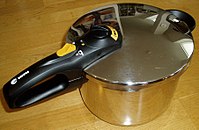
Photo from wikipedia
Abstract This paper reported the preparation of a renewable plasticizer originated from waste cooking oil (WCO). The plasticizing effect of the developed material on the properties of poly(vinyl chloride) (PVC)… Click to show full abstract
Abstract This paper reported the preparation of a renewable plasticizer originated from waste cooking oil (WCO). The plasticizing effect of the developed material on the properties of poly(vinyl chloride) (PVC) was studied. The results showed that epoxy groups were covalently bonded on the fatty acid derivated from WCO through the addition and epoxidization reactions. Compared with commercial dioctyl phthalate plasticizer, the plasticizer developed in this study improved the thermal stability and flexibility of PVC along with a lower glass transition temperature. The plasticizer showed marginal volatility and excellent resistance for migration in PVC matrix. The mechanism behind such observation was discussed. The novelty of this study lies in the introduction of epoxy groups to the ester and carbon-carbon double bonds in the fatty acid, which endowed the synthesized plasticizer a higher epoxy value. The perspective of using the developed material as an environment-friendly plasticizer for PVC was outlooked.
Journal Title: Journal of Cleaner Production
Year Published: 2020
Link to full text (if available)
Share on Social Media: Sign Up to like & get
recommendations!